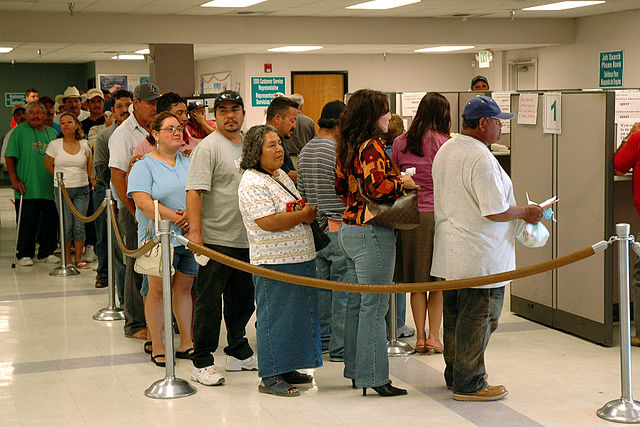- 14 3402-5578
- Rua Hygino Muzy Filho, 737, MARÍLIA - SP
- contato@latinoobservatory.org
 Foto: Michael Raphael
Foto: Michael Raphael
The U.S. unemployment rate returned to its all-time low of 3.5% in December 2022. However, as CNN Business demonstrates unemployment rates for black women and Latino men have not yet fully recovered from the early pandemic.
The unemployment rate for black women aged 20 and over rose to 5.5% in December from the 4.8% recorded in February 2020, according to the Bureau of Labor Statistics (BLS). As for Latino, unemployment increased 0.4 percentage points by 4% in December 2022, above the unemployment rate of 3.1% in February 2020.
Compared to other demographic data, for white women 20 years and older, unemployment is lower or the same now than before the pandemic. In this follow-up, in December the unemployment rate was 2.8%, while for Asians it was about 2.5%, 3% for white men and 4% for Latinos, according to the BLS.
There are several reasons for rising unemployment for black and Latino women, said Kate Bahn, chief economist at the Washington Center for Equitable Growth, a nonprofit research and donation organization.
The main one is the prolonged effects of the pandemic, occupational segregation that agglomerates black or non-white people in low-paid jobs, and the care responsibilities of women within families.
“We’ve had a really remarkable recovery, but it appears as though Black women … we know they lost the most initially for a variety of reasons… have not yet recovered the same way other groups of workers have”, Bahn told CNN.
“What we saw was Black women were in this truly impossible position of being primary caregivers in families while working jobs that were hit (some of) the hardest in the pandemic”, Bahn said, noting that the retail, hospitality and health care sectors were disproportionately impacted by job loss and job risk.
According to the publication, “Leisure and hospitality lost more than 8.2 million jobs at the outset of the pandemic, nearly half of the sector’s total employment in February 2020. During the past two years, those jobs have come back, but the sector is still nearly 5.5% below pre-pandemic employment levels, according to BLS data”.
The government’s current response to inflation may also be playing a role in rising unemployment for Latino men and Black women, Bahn said.
“Cooling the economy, the way the Fed is intentionally doing to mitigate inflation, it’s going to be those marginalized workers or workers with the least power who will lose initially”, she said. “So that might be some of what we’re seeing there as well.”
“Hispanic workers are still trying to recover from early in the pandemic, when they suffered the highest unemployment rates on record. In April 2020, the Hispanic unemployment rate shot up to 18.1% after hovering at around 4% pre-pandemic, BLS data shows”.
Latinos and Black workers are also up against structural racism and implicit bias, Bahn added, noting that “even people who may not hold racist beliefs will ultimately replicate racist outcomes”.
“Employers are less likely to make job offers to
Black people, Bahn said. And when they do, the money on the table is often
lower. In addition, when company downsizing happens, Black employees are more
likely to be laid off”, she said.











